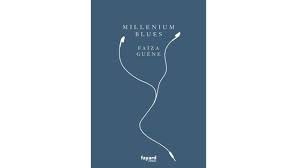Millénium blues
Faïza Guène
Millénium Blues (Fayard) is a novel about nostalgia, regrets and various forms of forgiveness. With its fifty-five short and ultra short chapters made up of sharp dialogue and crisp spare writing, it reads like a graphic novel. The book is set in Paris from the late 1990s to the present time and recounts fifteen years – non-chronologically, since, as the author points out, memory doesn’t work like that – in the lives of two ‘Generation Y’ friends: Zouzou and Carmen. It’s a fast-moving read, right from the start, beginning with an accident during a heat-wave. Millénium Blues shows how time passes all too quickly and the importance of being awake to the present, of valuing each moment. The book has a background sound-track of songs (from ABBA to Idir), and is punctuated by historical events, such as: The World Cup 1998; September 11 2001; the second round of the presidential elections in France (Right against Extreme-Right) in 2002. An event of a different sort, and key to this novel, is the ‘forfait Millénium’, a telephone deal offered by Bouygues Télécom leading up to the Millenium, where you paid a fixed amount and could have unlimited talk-time in the evenings and over the weekend. This allowed people to free up how they spoke on the phone, ‘to tell each other things aside from what was essential’ (‘se dire autre chose que l’essentiel’). It’s the dialogue between the characters that is, for me, the book’s great appeal. Faïza Guène has created a novel that is both light and profound, with exchanges between the characters – such as those between the main character, Zouzou, and Simone, a woman in her eighties, and between Zouzou and her father – that are by their very lack of sentimentality, poignant.
Musical ps: A Vava Inouva by Idir https://www.youtube.com/watch?v=JCpc7ch4nd4
Millénium Blues (Fayard) est un roman sur la nostalgie, les regrets et les diverses formes de pardon. Avec ses cinquante-cinq chapitres courts, ultra courts même parfois, bâtis de dialogues percutants et d’une écriture économe, ce livre fait un peu ‘roman graphique’. L’histoire a lieu à Paris, de la fin des années ‘90 à nos jours, et raconte quinze années (pas dans l’ordre, puisque, comme dit l’auteure, ce n’est pas comme ça que marche la mémoire) de la vie des deux amies de la ‘Génération Y’ : Zouzou et Carmen. Et cette histoire file à toute allure, dès le départ, en commençant par un accident en pleine canicule. Millénium Blues montre à quel point le temps passe très vite, et l’importance cruciale d’être consciente du moment présent, de vivre pleinement chaque instant. Le livre se déroule sur un fond de bande son (d’ABBA à Idir), et est jalonnée d’événements historiques, tels que la coupe du monde 1998, le 11 septembre, le second tour de l’élection présidentielle de 2002 (la droite contre l’extrême-droite). Un événement d’un autre genre et fondamental à ce roman, c’est le ‘forfait Millénium’, une offre téléphonique de Bouygues Télécom lancée juste avant le passage à l’an 2000, où on payait une somme fixe et pouvait parler sans limite le soir et pendant le week-end. Cela permettait aux gens de parler plus librement au téléphone, de ‘se dire autre chose que l’essentiel’. ce sont les dialogues entre les personnages qui font pour moi tout l’attrait du livre. Faïza Guène a crée un roman à la fois léger et profond, avec des échanges entre personnages (comme ceux d’entre le personnage principal, Zouzou, et Simone, une octogénaire, et entre Zouzou et son père) qui sont, par leur anti-sentimentalisme, justement, poignants.
ps Faïza Guène est l’invitée d’Augustin Trapenard sur France Inter: https://www.franceinter.fr/emissions/boomerang/boomerang-10-janvier-2018